Strengthening labour rights to prevent human trafficking and unsafe migration
Outcome of the Global Consultation on Prevention of Human Trafficking and Unsafe Migration
| Español | Français |
1 May 2019
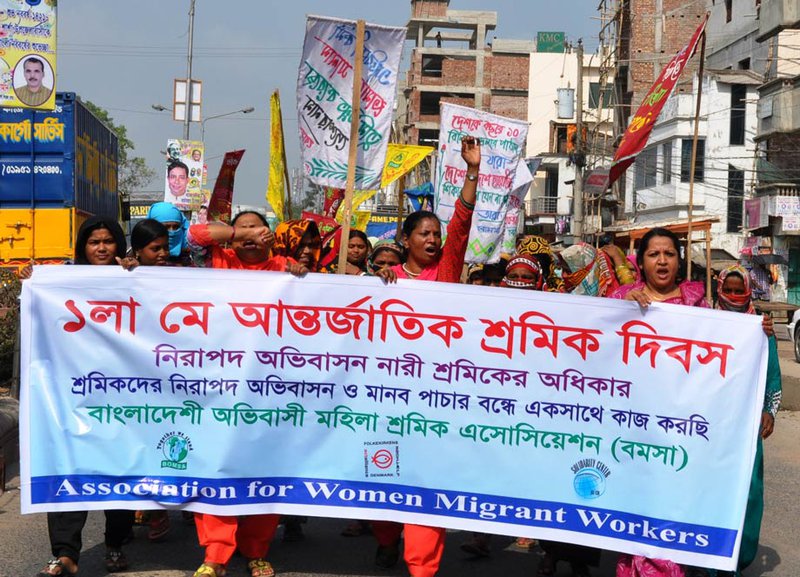 |
| Women from BOMSA, a GAATW member organisation in Bangladesh, at a 2014 May Day Rally in Dhaka. |
Forty-five representatives of 35 women’s rights, migrant rights, and anti-trafficking organisations from 28 countries met on 3-5 April 2019 in Bangkok, Thailand, to discuss the successes and failures of current initiatives to prevent human trafficking and unsafe migration.
We reaffirmed that human trafficking and other rights violations in the context of migration for work are the result of a number of structural root causes. These include economic injustice brought about by neoliberal economic policies of privatisation, de-regulation and austerity, which intersect with patriarchy and racism to devalue and informalise women’s work, particular that of migrant and racialised women.
To successfully prevent human trafficking and related rights violations, states need to address these root causes in line with their commitments under the human rights framework and the Sustainable Development Goals. Civil society needs to advocate for structural changes to systems of domination based on race, gender, and class, and hold governments accountable for their failure to protect the human rights of all people. Current initiatives to prevent trafficking through engagement with the private sector and reduction of the demand for trafficking, awareness-raising and campaigning, and provision of information to (potential) migrants, fall short of these goals and fail to address the asymmetrical power relationships between workers and employers.
Missing the mark on gender equality: Governments don’t do enough to ensure womxn’s rights to social protection and public services
A Joint response from trade unions, and feminist, womxn’s rights and social justice organisations to the CSW63 Agreed Conclusions
The 63rd session of the Commission on the Status of Women saw vibrant participation of civil society, people’s movements, trade unions, collectives of informal sector workers, sex workers’ movements, feminists and womxn’s organisations, many demanding universal social protection, gender responsive public services and infrastructure that is publicly funded, delivered and managed.
We laud the Commission achieving significant gains during its 63rd session March 8-22, 2019. We believe, however, that governments failed once again to show leadership and make commitments to center gender equality and womxn’s economic and social rights and pursue systemic changes required to deal with intersecting crises. Moreover, we are deeply disappointed that governments did not uphold the universality of human rights and specifically recognise multiple and intersecting discrimination based on sexual orientation, gender identity, expression and sex characteristics.
Public services and social protections key to migrant women’s rights
Statement by the Global Alliance Against Traffic in Women on the occasion of International Women’s Day and ahead of the 63rd session of the UN Commission on the Status of Women
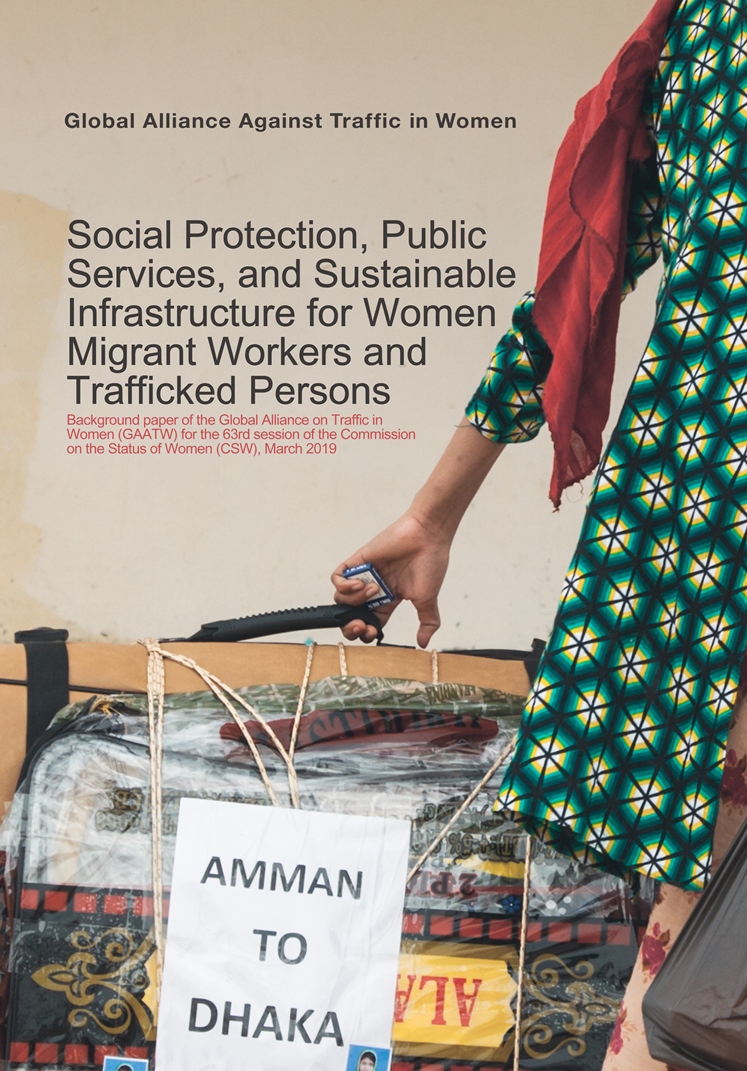 The Global Alliance Against Traffic in Women calls on states to increase their investment in public services and social protections as a way to prevent human trafficking and protect the rights of migrant and trafficked women.
The Global Alliance Against Traffic in Women calls on states to increase their investment in public services and social protections as a way to prevent human trafficking and protect the rights of migrant and trafficked women.
Migrant and trafficked women cite the absence of social protection systems as key in their decisions to migrate, regardless of the risk. This distress migration enables a supply of workers in precarious labour sectors, such as the domestic and garment work, which do not enjoy basic protections and increases the risks of trafficking and exploitation.
In destination countries, migrant workers, particularly women domestic and care workers, are often employed to fill gaps in social protection and services, where economic pressures and austerity measures have increased the unpaid care burden on women. In some countries, migrant workers have been recruited to meet longstanding recruitment problems, and make up large sectors of the workforce particularly in health and education.
In origin countries, women migrant workers play a crucial role in compensating for the underfunding or absence of public services. Their remittances are used to clothe, feed, house and educate their families.
Despite playing an outsized, and trans-boundary role in social protection, migrant women are also among the groups least able to access services and social protection. Access to public services and social protection systems are key to the fulfilment of the rights of migrant women, and to preventing trafficking but progress is threatened by budget cuts and austerity measures that have resulted in the privatisation of public services and increased user fees.
Austerity measures, including the underfunding of public services, have a detrimental impact on the ability to prevent, detect and respond to cases of trafficking. Given their role in victim identification, it is critical that public service providers, including labour inspection, law enforcement, immigration, health and social service providers have resources to identify and assist potential trafficked persons.
Irregular migrants, refugees or trafficked persons? Challenging rigid categorisations and their impact on migrants’ lives
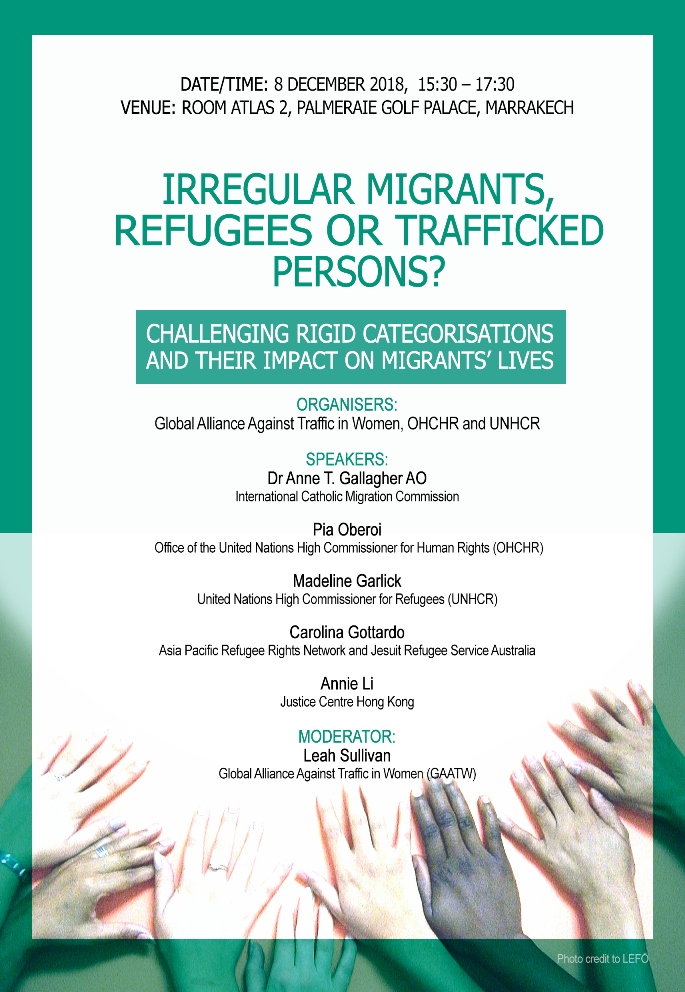
8 December 2018, 15:30 – 17:30, Room Atlas 2, Palmeraie Golf Palace, Marrakech
Organisers: Global Alliance Against Traffic in Women, OHCHR and UNHCR
This event will present the findings of the articles published in the above-mentioned journal and contribute to a conversation about the categories assigned by states to people on the move, the impact of these categories on migrants’ lives, and how the global compacts for refugees and for migration can support efforts to protect the rights of all people on the move.
Categorising Migrants: Standards, complexities, and politics
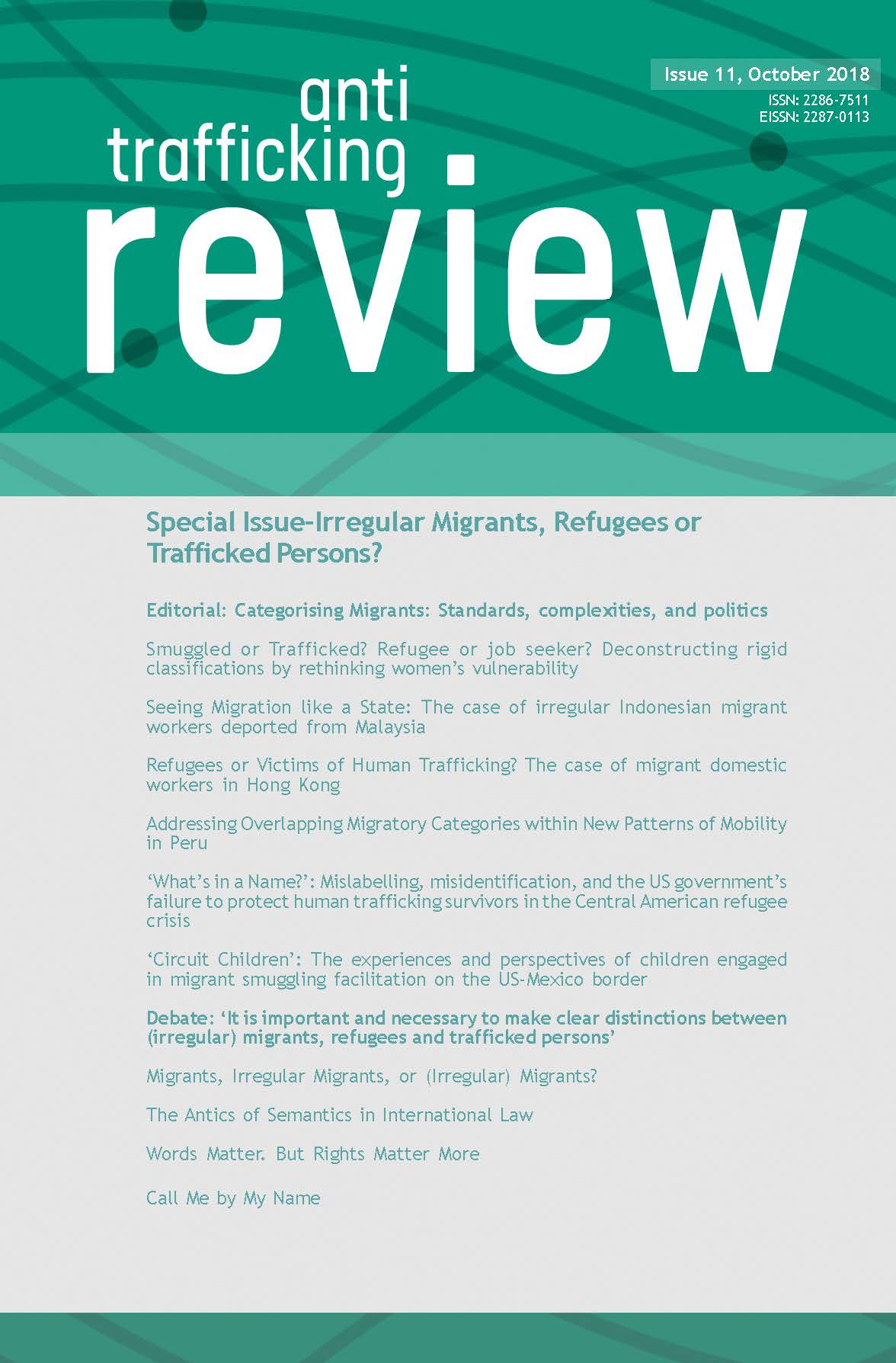 Launch of Issue 11 of Anti-Trafficking Review ‘Irregular Migrants, Refugees or Trafficked Persons?’
Launch of Issue 11 of Anti-Trafficking Review ‘Irregular Migrants, Refugees or Trafficked Persons?’
Guest Editors: Claus K. Meyer and Sebastian Boll
Editor: Borislav Gerasimov
International migration has become a ‘mega trend’ of our times, with more than 260 million migrants living outside their country of origin in 2017. Some people move in search of better livelihood opportunities, others flee conflict, environmental degradation or natural disasters, and yet others are deceived or coerced into exploitative work. At the same time, the categories developed by the international community for people on the move—such as smuggled migrants, refugees, or trafficked persons—are increasingly inadequate to capture today’s complex migration flows. Yet the label that a person is given by authorities can mean the difference between assistance and protection, or arrest and deportation.
Letter to the Indian government regarding Anti-Trafficking Bill
Ms. Maneka Sanjay Gandhi
Ministry of Women and Child Development, Government of India
Shastri Bhavan
New Delhi -110001
Chetan B. Sanghi, IAS
Joint Secretary
Ministry of Women and Child Development
Government of India
29 July 2018
Letter to the Indian government concerning the draft Trafficking of Persons (Prevention, Protection and Rehabilitation) Bill, 2018
Ms. Maneka Sanjay Gandhi
Ministry of Women and Child Development, Government of India
Shastri Bhavan
New Delhi -110001
Chetan B. Sanghi, IAS
Joint Secretary
Ministry of Women and Child Development
Government of India
13 July 2018
Life after trafficking – an often neglected aspect of anti-trafficking policy
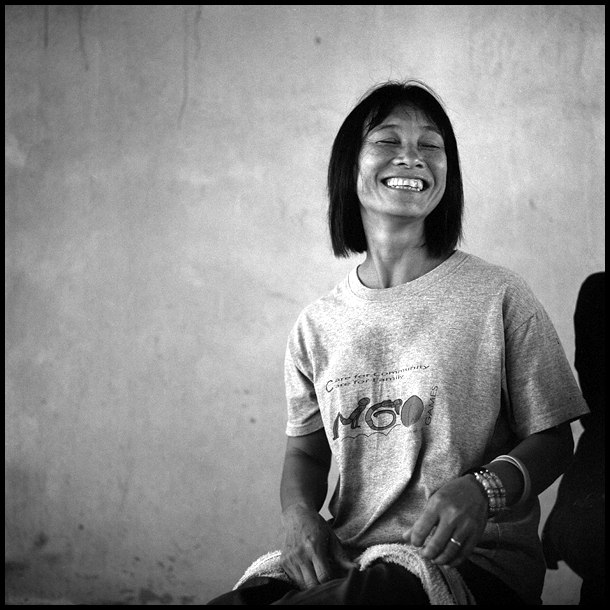 Most media stories, politicians’ speeches and NGO campaigns typically focus on the horrors of life in trafficking and dramatic rescues and escapes. The only thing we usually hear about what happens next is something like “she was reunited with her family and loved ones” or “now he is helping others like him”.
Most media stories, politicians’ speeches and NGO campaigns typically focus on the horrors of life in trafficking and dramatic rescues and escapes. The only thing we usually hear about what happens next is something like “she was reunited with her family and loved ones” or “now he is helping others like him”.
But after trafficking, most trafficked persons don’t simply go on to live happily ever after. They have different needs, and have to go through a number of bureaucratic hurdles to access support and be able to move on. These include identification, short and long-term assistance, residence permits, compensation and family reunification.
And all of this occurs in a context where countries of destination, in particular, are hostile towards migrants and reluctant to provide assistance to foreigners, including victims of trafficking.
These were some of the concerns that prompted us to focus the latest issue of the Anti-Trafficking Review on “life after trafficking”.
The papers in this issue cover a wide range of countries that are considered both origin and destination: Indonesia, Thailand, Bangladesh, India, Azerbaijan, Switzerland, Denmark, Norway, Nigeria, United Kingdom and United States. Below are some of the main issues highlighted in the articles.
